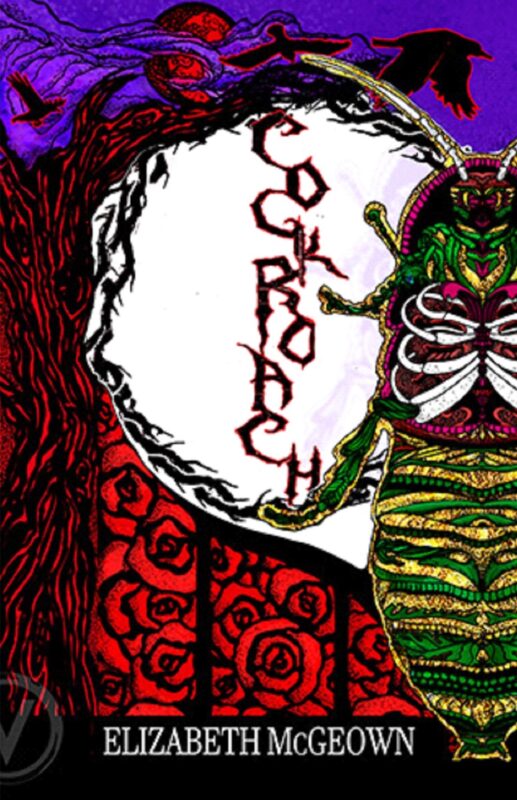REVIEW: ELIZABETH MCGEOWN’S ‘COCKROACH’
By Stella Backhouse

There are a number of reasons not to read Elizabeth McGeown’s 2022 collection Cockroach. If slugs, snakes, maggot-infested dead birds, creepy-crawlies in general and the titular arthropod in particular make you want to run and hide, be warned that there are liberal sprinklings of all of them throughout the book. If – like me – horror isn’t your go-to genre, there will be references that don’t resonate. Finally, if you’ve ever been bullied or made to feel unwanted at school, work or elsewhere, reading this book could revive unwelcome memories. And yet: even if all these negatives can be applied to you, I’d still encourage you to give Cockroach a try if you can because this is a book about turning negatives into positives. It’s about embracing outsiderhood. If McGeown ever wanted to re-name it, Turn and Face the Strange might well make the shortlist.
Cockroach is a semi-autobiographical collection that follows the poet (or self-dubbed ‘Cockroach’) through three phases of her life, starting with childhood awareness not fitting in with peers, failing to meet parental expectations, physical health problems/neuroatypicality and finding herself unrepresented in popular culture. The second section, ‘The World Beyond The Tower’ adds to this already disheartening mix with its documenting of the difficulties of negotiating an adult world riven with institutional sexism, British (and Irish) biases against people from Belfast and the sometimes lukewarm reception offered by established poets to those aspiring to join their ranks. In ‘Becoming’ (the third section), McGeown celebrates finding her role models, vanquishing her demons, loving herself for the person she is rather than the person society would like her to be and learning to ignore those who question her.
In the context of the collection, the name ‘Cockroach’ is not a term of abuse; rather, it symbolises the liberation inherent in the inversion of conventional female narratives. In ‘Three Fictional Women Meme’, culturally acceptable femininity is represented by the fictional character Bridget Jones, who is seen to embody the idea that only unchallengingly ditsy women can be loveable: “I cannot resist him!/I cannot use my instinct to see who is bad for me!/I smoke, I cannot use my common sense/to know this is bad for me”. For Cockroach, the real-life consequences of this situation play out in ‘Simon Said’ when, as a singer in a band, she wants to contribute her song lyrics: “Simon said he must see if my lyrics/are good enough first./I asked who okayed his”.
Cockroach, by contrast, equates with tenacity and survival. In ‘Three Fictional Women Meme (ii)’, it is paradoxically the ‘othering’ of Cockroach that bestows strength: “Let them cockroach./Let them cling to rocks while others fall. Let them be/better than you, and achieve, and last longer…They control their own/tension while you release and die”. The message here is that beyond conventional norms, other narratives exist – but, in order to grasp them, we first have to reconceptualise how we see them. The dark allure of the cockroach identity is based on conflating parallel fears of insects/of women; by exploiting these fears, Cockroach derives her Gothic power.
It would be a mistake however to consign Cockroach entirely to the dark side. Many of the collection’s most joyous moments are associated with the liberating sensations of dance. Dance is portrayed as an irresistible impulse of self-expression that overrides society’s rules. In ‘Villain (viii)’ dance is “how we transcend/manual to automatic. All arms and instinct,/extended stim. We feel our grace even if you do/not see it as such, if you tell us we are awkward”. In the final poem, ‘Villain (xvi)’ (the ‘Villain’ poems form a series threaded through the text, a riposte to the question of why, in films, “did I see myself as the villain?”), abandonment to dance is synonymous with letting go of the need to seek society’s approval. “Why fold my arms and suppress/the Busby Berkeley in me?/I could only say to win approval./Her head cocks to one side, asks/This approval, did you get it?…Well then, she says. Well then./Dance”.
Cockroach is a journey of self-discovery achieved by un-learning society’s norms around what is beautiful and what is ugly. It’s a message of hope to anyone who has ever felt the pain of not fitting in.
Cockroach is available to purchase online, direct from Elizabeth’s website and through publisher Verve Press, as well as other bookshops and retailers.
